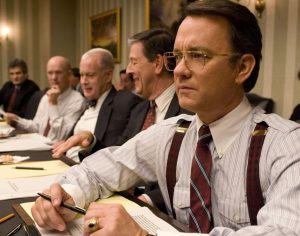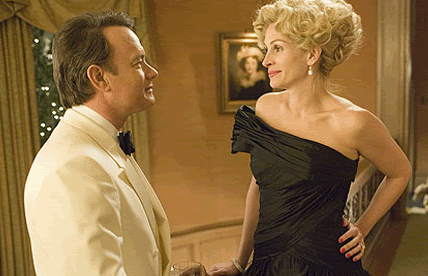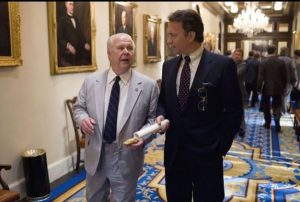
I like Charlie Wilson. He’s the sort of politician we always claim to find repellant and oily, but in the trenches of an increasingly ugly profession, he’s the only one ever left standing. The real Mr. Wilson — the one not necessarily encompassed by the film in question — was a Congressman from the 2nd congressional district in Texas. A committed liberal, he fought for assorted business regulation, Medicaid, the Equal Rights Amendment, and even abortion rights in a state that shits on Roe as a matter of course. Like fellow Texan Lyndon Baines Johnson, his passions were a curious mix of genuine sentiment, hard-ass realpolitik, and ego-driven backslapping, but he always did right by his constituents, never forgetting that as highfalutin as rhetoric can get in Washington, a man is only judged by what he delivers to the folks. Wilson just happens to be the sort of man who doesn’t care how it’s done, just so long as the people are happy. And if such a man also happens to love women, booze, and snorting a little cocaine in Vegas, who’s to argue?
More than that, if he has to cozy up to shady characters, military dictators, and a right-wing heiress now and again, does that make his accomplishments any less honorable? Those who believe our representatives in government should be composed of little more than choir boys and virginal nuns might argue for spotless resumes and absolute transparency, but for inhabitants of the real world — those who long ago surrendered any notions of a clean fight — the ends do more than justify the means; they render all discussion of them null and void. Democracy, even the imperfect shell game we now offer as a last, best hope, is never defended by the nobler intentions we as Americans claim to live by. Instead, it is brought kicking, screaming, torn, and bloody into the arena again and again, where the battles are re-fought, re-tested, and pushed to the brink. By men like Charlie Wilson.
And so, we have Charlie Wilson’s War, a smart, savvy, utterly cynical tale by Mike Nichols and Aaron Sorkin, that also happens to have a devotion to wit far too many political films forget to include in their sanctimonious rush to relevance. Unlike humorless, pedantic sermons like Lions for Lambs, or any number of mind-numbing Iraq documentaries, Charlie Wilson’s War doesn’t try to make a case for Mr. Smith going to Washington; it is content to get its hands dirty and prove — again and again — that good intentions not only go awry, they often lead to a deadly, catastrophic blowback.

And that those responsible, even unknowingly, can be decent, hard-working, and up to their eyeballs in bullshit, with such complexities not making them any less attractive. Hollywood tends to take clear sides in political debate, with just the right number of black and white hats to go around, but here, such oversimplifications are left conspicuously absent. Charlie Wilson is fun-loving, charming, and would no doubt be one hell of a dinner companion (he retains a gift for Texas tall tales), but he’s not about to give up pussy or the demon rum anytime soon. And if he has to challenge his party by hitting the sheets with rabid anti-Communists, what difference does it make?
Wilson, as such, is not a rigid ideologue. He champions the poor and the disenfranchised, but he’s not above wanting to kill a few Soviets along the way. With a bottle of scotch in hand, if necessary. As portrayed by Tom Hanks (giving one of his most winning performances in years), he is an easy man to love, even if we understand that his support of the Mujahideen will eventually put advanced weaponry in the hands of the Taliban. And while the film does connect the actions of Wilson and the CIA with 9/11 (most directly, with a final quote), it never does so with self-righteous glee.
All along, we share Wilson’s enthusiasm, largely because he appears to be having so much fun making the impossible possible. Much of his commitment resulted from a visit to refugee camps in Afghanistan (and conversations with the president of Pakistan, himself a murderous thug), but for all the emotional welling in his eyes, he also saw this as an opportunity to bring the Soviet empire to its knees without firing a shot. Let someone else bear the brunt of the sacrifice, and we’ll pick up the tab; clean, simple, and morally sound.

Even now, knowing what we know — and how quickly the Liberated nation of Afghanistan turned to Islamic fundamentalism — Wilson’s actions are proper course of action for the time. While the film isn’t the complete story of those events (it clocks in at a brisk 97 minutes), it is a solid (and sufficient) representation of a man and his times. Moreover, we are also treated to Wilson’s Sidekick of sorts, CIA agent Gust Avrakotos (Philip Seymour Hoffman). He is a fat, tired, depressed sort who, among other traits, has a mustache that threatens to become its own character.
He too is a drinker and a gambler by trade, and in Wilson he senses exactly what he needs to push the USSR to the brink. Gust can do much with his skills as an undercover operator, but he needs Charlie to secure agency funding, which he does in a relatively brief amount of time, doubling and tripling the take to the point where it eventually tops out at $1 billion. Gust’s contacts could also furnish information on the best, most effective weapons with which to fight the Soviets, including the most vital tool of all: anti-aircraft weapons that could decimate the deadly helicopters that so ravaged the Afghan landscape. For this, though, we would need third party support. Israel, perhaps? But could they work with Pakistan?
Wilson is also followed around by a Girl Friday of sorts, in the form of personal assistant Bonnie Bach (Amy Adams), the sort of character that seems obligatory, but whose presence is never meant to be the “voice of reason” so often found in political parables. Nor is she especially wise-cracking, thank fuck. Instead, she is simply around to take care of Charlie’s needs, though she is the one woman in his world he doesn’t appear to be screwing. The rest of his congressional office is manned by a stable of well-endowed young dames, all of whom appear to have been hired to keep Charlie’s erections frequent and everlasting.

Oh yeah, and he doesn’t apologize for it. Wilson is a confirmed sexist to his Lone Star core, and only a fatal heart attack is likely to thwart his progress with the female of the species. Joanne Herring (Julia Roberts) is the Republican rich broad of the piece, and while she’s always annoying (unavoidable given the actress asked to play her), it makes sense why Charlie’s interested. Their flirtations and bedroom antics are a joy to behold, and a great lesson for all those who forgot that Hanks could do comedy when given the right script. After all, from Charlie’s perspective, party labels don’t mean a thing when you’re both naked. Nothing much does.
Because the film jets from foreign locales to the halls of Congress, rarely pausing for breath, it never has the opportunity to let us down with tedium and humorless point scoring. Yes, there are a few scenes that could have been cut, including a laughable exchange between two Soviet pilots that sadly jumped from humor to eye-rolling farce, but on the whole, this is a tight, focused film that refuses to belabor anything. Surprisingly, the script assumes we can keep up, and never resorts to condescension or rubbing our noses in its superior point of view. Nichols and Sorkin won’t be receiving Christmas cards from the Cato Institute any time soon, but unlike so many embarrassingly overwrought left-wing adventures, this is a film for adults, not infants needing a pat on the head. Yes, the United States sent millions of dollars elsewhere and then abandoned ship once it got bored, but this is hardly a crime left at Republican doorsteps alone.
For every president using back channels and surreptitious networks to hammer down a foreign policy in his own image, there sits a gutless Congress rarely looking for a fight. Even now, as Iraq funding bills sail through unchallenged, the eunuchs in the opposition party do little but grab their blankets and head off for nap time. As is usually the case with an out-of-control drunk, he is only as dangerous as his enablers. Concerning Afghanistan, once the USSR went out of business for good, most of our elected officials lost interest, proving yet again that far from conspiracy guiding our ends, it is sheer incompetence that turns freedom fighters into hijackers bent on mass murder.

In the case of Charlie Wilson, I doubt it was either. The film leaves us with his belief that we “fucked up the endgame,” but somehow, I expect he knew it had no other possible outcome. Men like Charlie grease palms, liquor up to carry out the undesirable, and use their cocks to align the planets, but like so many otherwise talented politicos, they take on too much and end up killing the very things they hold dear. Or maybe he forgot that once a thing is started, the idea of an ending is at best illusory.
As Vietnam will forever stain (and outshine) LBJ’s ambitious domestic agenda, the sight of a burning World Trade Center will ensure a level of controversy and suspicion in Wilson’s own legacy. But leave that for the history books. As good as it can be, the cinema is never a substitute for the written record. There are omissions, additions, and consolidations that constrain and define the medium, as well as the obligation to entertain. Charlie Wilson’s War remembers that crucial detail in full, and with such a maxim under its wing, confirms that intelligence and laughter need not inhabit opposing camps. And that, like the Texas saying goes, though it’s best to dance with them that brung ya, on occasion you might have to slip away with a stranger to set things right. Be it Republican, Mujahideen, or just some garden variety SOB.
Leave a Reply